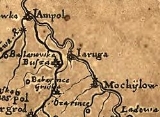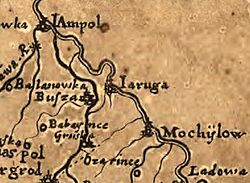
Peace of Busza
Encyclopedia

Polish-Lithuanian Commonwealth
The Polish–Lithuanian Commonwealth was a dualistic state of Poland and Lithuania ruled by a common monarch. It was the largest and one of the most populous countries of 16th- and 17th‑century Europe with some and a multi-ethnic population of 11 million at its peak in the early 17th century...
and Iskender Pasha
Iskender Pasha
Iskender Pasha , also Iskender Paşa, was an Ottoman Commander and the beylerbey of Oczakov . In 1620 Iskender Paşa led an Ottoman army, with Wallachian contingents against the Polish-Lithuanian Commonwealth at the Battle of Ţuţora , where he was victorious.-Notes:...
of the Ottoman Empire
Ottoman Empire
The Ottoman EmpireIt was usually referred to as the "Ottoman Empire", the "Turkish Empire", the "Ottoman Caliphate" or more commonly "Turkey" by its contemporaries...
in Busza
Busha
Busha is a village in Yampilskyi Raion, Vinnytsia Oblast, Ukraine. It got the status of a city in the early 17th century. In 1629 there were 2.000 people living in this city.-History:...
(Bose) near the Jaruga
Jaruga
Jaruga is a village in the municipality of Bosansko Grahovo, Bosnia and Herzegovina....
and Dniester
Dniester
The Dniester is a river in Eastern Europe. It runs through Ukraine and Moldova and separates most of Moldova's territory from the breakaway de facto state of Transnistria.-Names:...
rivers on September 23, 1617. Polish and Ottoman armies met, but decided to negotiate, instead of to fight. In this peace treaty
Peace treaty
A peace treaty is an agreement between two or more hostile parties, usually countries or governments, that formally ends a state of war between the parties...
Polish-Lithuanian Commonwealth
Polish-Lithuanian Commonwealth
The Polish–Lithuanian Commonwealth was a dualistic state of Poland and Lithuania ruled by a common monarch. It was the largest and one of the most populous countries of 16th- and 17th‑century Europe with some and a multi-ethnic population of 11 million at its peak in the early 17th century...
agreed to cede the Khotyn
Khotyn
Khotyn is a city in Chernivtsi Oblast of western Ukraine, and is the administrative center of Khotyn Raion within the oblast, and is located south-west of Kamianets-Podilskyi. According to the 2001 Ukrainian census, it has a population of 11,124...
to the Ottomans and to stop its interference in Moldavia
Moldavian Magnate Wars
The Moldavian Magnate Wars refer to the period at the end of the 16th century and the beginning of the 17th century when the magnates of the Polish-Lithuanian Commonwealth intervened in the affairs of Moldavia, clashing with the Habsburgs and the Ottoman Empire for domination and influence over the...
.
That 1617 treaty stated that Poland would not interfere in the internal affairs of Ottoman vassals in Transylvania
Transylvania
Transylvania is a historical region in the central part of Romania. Bounded on the east and south by the Carpathian mountain range, historical Transylvania extended in the west to the Apuseni Mountains; however, the term sometimes encompasses not only Transylvania proper, but also the historical...
, Moldavia
Moldavia
Moldavia is a geographic and historical region and former principality in Eastern Europe, corresponding to the territory between the Eastern Carpathians and the Dniester river...
and Wallachia
Wallachia
Wallachia or Walachia is a historical and geographical region of Romania. It is situated north of the Danube and south of the Southern Carpathians...
, the Commonwealth was to prevent Cossacks from raiding lands in the Ottoman Empire, while ceding Khotyn. In return, the Ottoman Empire promised to stop Tatar raids. The Ottoman Empire also had the right to interfere in Transylvania, Moldavia and Wallachia and select the rulers of that region.
The treaty would be violated by both sides, as Cossacks and Tatars
Tatars
Tatars are a Turkic speaking ethnic group , numbering roughly 7 million.The majority of Tatars live in the Russian Federation, with a population of around 5.5 million, about 2 million of which in the republic of Tatarstan.Significant minority populations are found in Uzbekistan, Kazakhstan,...
would continue to raid the borderlands. This would lead to a new war, but the status quo
Status quo
Statu quo, a commonly used form of the original Latin "statu quo" – literally "the state in which" – is a Latin term meaning the current or existing state of affairs. To maintain the status quo is to keep the things the way they presently are...
of the peace of Busza would be confirmed in the aftermath of the Polish-Ottoman War (1620–1621)
Polish-Ottoman War (1620–1621)
The Polish-Ottoman War or First Polish-Ottoman War was a conflict between the Polish–Lithuanian Commonwealth and the Ottoman Empire over the control of Moldavia...
by the Treaty of Khotyn
Treaty of Khotyn
Treaty of Khotyn , signed in the aftermath of the Battle of Khotyn , ended the Polish-Ottoman War . This peace treaty resulted in no border change but Polish-Lithuanian Commonwealth agreed to stop its interference in Moldavia...
.

